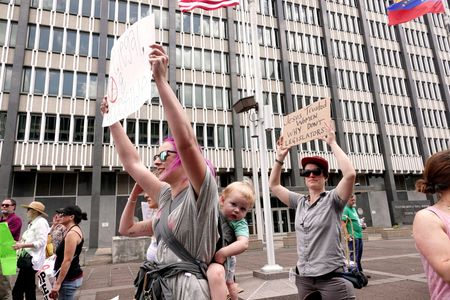By Gabriella Borter
KANSAS CITY, Missouri (Reuters) – Rachel Sweet joined dozens of rally goers in a Kansas City, Missouri union headquarters parking lot on a warm October Saturday, holding a sign that read “Yes on 3” and joining a call-and-response chant: “When women’s rights are under attack, what do we do? Stand up, fight back!”
Sweet, 33, could have been any of the union workers, faith leaders or abortion rights canvassers gathered in support of Amendment 3, a measure on the Missouri ballot in the Nov. 5 election that would enshrine the right to abortion in the state constitution.
But in the two years since the U.S. Supreme Court overturned Roe v. Wade and eliminated federal abortion rights in 2022, the self-described “polite midwesterner” has been a guiding force behind a winning streak for abortion rights in conservative states.
Seven states have put the issue of abortion to voters through ballot measures since that ruling, and abortion rights campaigns have won every vote.
Sweet, a former lobbyist for Planned Parenthood, led campaigns to defeat anti-abortion initiatives in two of those states – Kansas and Kentucky. She was a senior adviser on Ohio’s campaign to establish abortion rights last year, traveling to the state days after her wedding to knock on doors with her husband.
In all three states, the campaigns sidestepped party politics on the issue and cast abortion bans as instances of government overreach.
Sweet is hoping to extend that winning streak with a similar approach in her home state of Missouri and overturn one of the strictest abortion bans in the country. The Missouri law, which took effect the day Roe was overturned, makes no exceptions for rape or incest and carries a 15-year prison term for doctors who perform abortions outside of medical emergencies.
If Sweet wins, it will be the first time that voters reversed a total ban and reinstated legal abortion through fetal viability, or around 24 weeks gestation.
“That’s what’s unique and why the stakes are so high in this race,” Sweet said.
Anti-abortion activists are asking voters to reject the measure, even if they do not agree with the ban, arguing that the amendment would loosen Missouri’s abortion restrictions too much.
ABORTION ON THE BALLOT IN SEVERAL STATES
At least nine other states, including election battlegrounds Arizona and Nevada, will also vote on abortion ballot measures on Nov. 5.
Democrats hope the measures will boost presidential candidate Kamala Harris’ chances with independents and Republicans in those states. But experts say support for ballot measures does not always translate to support for candidates. Voters can support the standalone initiative while backing Republican candidates.
Republican Donald Trump carried Missouri by 15 points in the 2020 election.
Sweet said a non-partisan ballot campaign could help sway independents – who make up 19.5% of Missouri voters as well as Republicans who make up 41.7% – by creating “a permission structure” for people who oppose abortion on religious grounds to vote against government restrictions.
“This is about talking to voters who may feel conflicted about abortion and who have complicated feelings around the subject, and finding common ground with them,” Sweet said.
The campaign has deployed physicians, faith leaders, and women who have had abortions to speak in support of the amendment.
A Sept. 12-13 survey by Emerson College Polling/The Hill found 58% support among likely Missouri voters for the measure, and 30% opposed.
A similar playbook helped Sweet defeat anti-abortion ballot measures by 59% in Kansas and by 52% in Kentucky in 2022.
Sweet’s midwestern roots help make her an effective messenger, said Emily Wales, president of Planned Parenthood Great Plains.
A Kansas City resident for 20 years, Sweet attends church most Sundays.
“She’s from our community. She knows how to talk to people from Missouri, Ohio, Kentucky,” Wales said.
Sweet said she is motivated by her belief that abortion access is “a fundamental issue of women’s equality.”
This will be her first opportunity to vote on an abortion rights measure.
“I really want to be a mom, and I don’t know that I feel safe doing that in Missouri. It’s very personal to me,” she said.
CASH SUPREMACY
With just over two weeks until the election, the abortion rights campaign, called Missourians for Constitutional Freedom, has a major cash advantage. The campaign has raised more than $21.8 million including $8.9 million from left-wing national political organizations The Fairness Project and the Sixteen-Thirty Fund, and $1 million from Democratic philanthropist Michael Bloomberg, according to campaign finance reports.
Groups opposing the amendment have raised at least $1.7 million from individual donors and Christian groups mainly in-state, campaign finance reports show. While lagging on fundraising, the anti-abortion movement has deep roots in the Bible Belt state, with Missouri politicians and church leaders urging their constituents and worshipers to reject the amendment.
Mary Elizabeth Coleman, a Republican State Senator and board member of the anti-abortion group Missouri Stands with Women, said the ballot measure’s language establishing a “right to reproductive freedom” was too broad and could extend to gender-affirming care and other issues not explicitly stated.
Last month, Coleman and other anti-abortion advocates sued to block the measure from appearing on Missouri’s ballot. The state supreme court threw out the case hours before the ballots were due to be printed.
“This is a proposal that is very extreme, and it goes far beyond what most people would find reasonable,” Coleman said.
Joyce Bischof, an 87-year-old retired airline employee with a yard sign reading “Save Our Babies God Bless” at her Kansas City home, said she opposed the amendment due to her faith.
“I’m a Catholic, and Catholics are very much against abortion,” said Bischof, a registered independent.
Hunter Hawthorne, a 28-year-old independent who works in IT and answered his door for an abortion rights canvasser, said he saw it differently.
“It just seems like a commonsense thing. Your body your choice. I wouldn’t want someone making laws about what I can do with my body,” he said.
(Reporting by Gabriella Borter; Editing by Paul Thomasch and Suzanne Goldenberg)


















